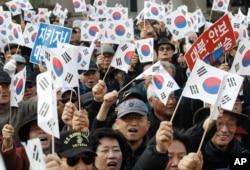South Korea President Park Geun-hye may have been found guilty in the court of public opinion for her alleged involvement in an influence peddling scandal, but the legal case against her is progressing slowly.
Park this week appointed attorney Yoo Yeong-ha, who immediately sought to delay prosecution plans to question her this week, saying he needed time to prepare, and suggested that the president might insist that the questions be submitted and replied to in writing, rather than meet face to face with investigators.
“A probe into the president should be carried out in a way that minimizes the burden of her duties, which I believe is in the spirit of the constitution,” he said.
Second investigation
On Thursday the National Assembly passed a measure appointing an independent special counsel to conduct a separate probe alongside the investigation currently being conducted by prosecutors in the Ministry of Justice.
Opposition leaders have voiced concerns that the Ministry of Justice working under the executive branch has too many ties to the president to conduct a credible investigation on its own.
“President Park is a person with authority over personnel. There is a limit to the investigation of the prosecution. As a result, in order to investigate President Park, a special probe must be conducted,” said Kim Jun-seok, a political science professor with Dongguk University in Seoul.
Delay tactics
The South Korean president seems intent on completing her single, five-year term of office that ends next year, despite weeks of massive public protests, increasing calls in the National Assembly for her to resign or be impeached, and with her approval rating hovering between 5 and 10 percent.
The opposition parties that hold a majority in the National Assembly say Park’s delay tactics are only delaying the inevitable.
“The pro-Park lawmakers of the Saenuri Party are opposing the public outcry for resignation, buying time to work their way out of the current difficulties,” said Park Jie-won, floor leader of the People Party, the second largest party in the opposition coalition.
Park also agreed to cooperate with the criminal probe looking into possible fraud and embezzlement involving the president’s long-time friend Choi Soon-sil.
Choi is suspected of exploiting her relationship with the president to pressure large corporations to donate nearly $68 million to two sports foundations by threatening them with tax audits unless they complied. She also is suspected of funneling much of that money to her private businesses. Some of Park’s closest aides also face possible criminal indictments for involvement in this alleged scheme.
“In the case of Ms. Choi, it can be a coercion charge. The charge of coercion under criminal law means that one pressures someone to conduct actions, which they are not obligated to do,” said Lim Ji-bong, a professor of law at Sogang University in Seoul.
Prosecutors are also looking into allegations that Choi, who holds no government title nor received any security clearance, was given access to classified information in her role as an informal adviser to the president. Critics charge Choi was much more than an adviser and exercised cultlike control over Park.
Choi has been in custody and undergoing questioning since October 31. She is expected to be charged in court Sunday.
A number of officials have also been questioned, including two of Park’s aides, Ahn Bong-geun and Lee Jae-man, who resigned last month.
Constitutional limits
The South Korean constitution prohibits the president from being charged with a criminal offense while in office, except for insurrection or treason.
Many legal experts however argue that the constitution allows for the president to be charged with a crime after he or she leaves office.
Park has denied any involvement in, or knowledge of, any wrongdoing that may have been committed by those around her.
By agreeing to cooperate, she set aside any constitutional questions whether criminal prosecutors could investigate a sitting president in South Korea.
According to South Korean media reports, the prosecution has notes from Park to a former presidential secretary ordering him to solicit funds from South Korean corporations for the sports foundations.
Choi or Park’s staff may also implicate the president in the alleged scheme to pressure private companies for donations.
“President Park can be a principal offender or an accomplice to charges of bribery or bribery charges through a third person. So how much President Park is involved in the case of Ms. Choi is needed to prove President Park’s charges as well as Ms. Choi’s charges,” said Lim.
These charges could be used by the opposition to pressure Park to resign or as cause to impeach her.
If Park resigns then a presidential election must be held within 60 days to select a new president.
Impeachment, if attempted, could take up to six months for the Constitutional Court to deliberate the legality of the charges and the process. And to reach the two-thirds majority in the National Assembly required for impeachment, 29 members of Park’s ruling Saenuri party would have to vote with the combined opposition to remove her from office.
Isolation
Under pressure, Park has agreed to hand over much of her power to a new prime minister to be selected by opposition parties that hold the majority in the National Assembly.
The current Prime Minister Hwang Kyo-ahn will attend the Asia-Pacific Economic Cooperation (APEC) summit in Peru this week as Park remains home to deal with the scandal.
But even without support in parliament the president can still exercise significant unilateral power in defense and national security matters.
Youmi Kim contributed to this report.






